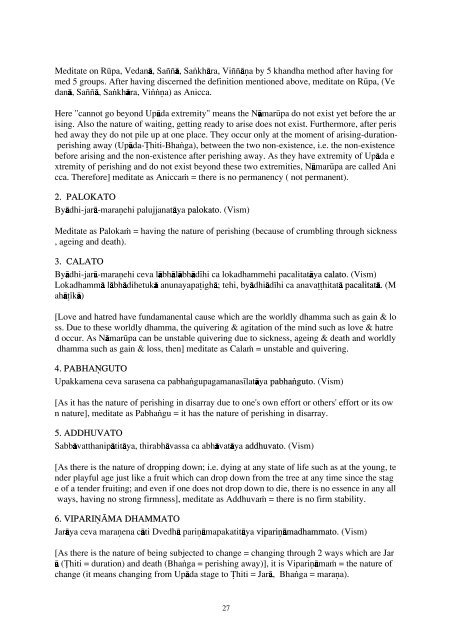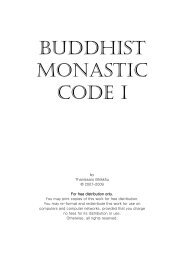Vipassana Kammatthana.pdf
Vipassana Kammatthana.pdf
Vipassana Kammatthana.pdf
You also want an ePaper? Increase the reach of your titles
YUMPU automatically turns print PDFs into web optimized ePapers that Google loves.
Meditate on RËpa, Vedanå, Saññå, Sa∫khåra, Viññåˆa by 5 khandha method after having for<br />
med 5 groups. After having discerned the definition mentioned above, meditate on RËpa, (Ve<br />
danå, Saññå, Sa∫khåra, Vi∫∫ˆa) as Anicca.<br />
Here "cannot go beyond Upåda extremity" means the NåmarËpa do not exist yet before the ar<br />
ising. Also the nature of waiting, getting ready to arise does not exist. Furthermore, after peris<br />
hed away they do not pile up at one place. They occur only at the moment of arising-durationperishing<br />
away (Upåda-Èhiti-Bha∫ga), between the two non-existence, i.e. the non-existence<br />
before arising and the non-existence after perishing away. As they have extremity of Upåda e<br />
xtremity of perishing and do not exist beyond these two extremities, NåmarËpa are called Ani<br />
cca. Therefore] meditate as Anicca◊ = there is no permanency ( not permanent).<br />
2. PALOKATO<br />
Byådhi-jarå-maraˆehi palujjanatåya palokato. (Vism)<br />
Meditate as Paloka◊ = having the nature of perishing (because of crumbling through sickness<br />
, ageing and death).<br />
3. CALATO<br />
Byådhi-jarå-maraˆehi ceva låbhålåbhåd¥hi ca lokadhammehi pacalitatåya calato. (Vism)<br />
Lokadhammå låbhådihetukå anunayapa ighå; tehi, byådhiåd¥hi ca anava hitatå pacalitatå. (M<br />
ahå ¥kå)<br />
[Love and hatred have fundamanental cause which are the worldly dhamma such as gain & lo<br />
ss. Due to these worldly dhamma, the quivering & agitation of the mind such as love & hatre<br />
d occur. As NåmarËpa can be unstable quivering due to sickness, ageing & death and worldly<br />
dhamma such as gain & loss, then] meditate as Cala◊ = unstable and quivering.<br />
4. PABHAÔGUTO<br />
Upakkamena ceva sarasena ca pabha∫gupagamanas¥latåya pabha∫guto. (Vism)<br />
[As it has the nature of perishing in disarray due to one's own effort or others' effort or its ow<br />
n nature], meditate as Pabha∫gu = it has the nature of perishing in disarray.<br />
5. ADDHUVATO<br />
Sabbåvatthanipåtitåya, thirabhåvassa ca abhåvatåya addhuvato. (Vism)<br />
[As there is the nature of dropping down; i.e. dying at any state of life such as at the young, te<br />
nder playful age just like a fruit which can drop down from the tree at any time since the stag<br />
e of a tender fruiting; and even if one does not drop down to die, there is no essence in any all<br />
ways, having no strong firmness], meditate as Addhuva◊ = there is no firm stability.<br />
6. VIPARIÔÓMA DHAMMATO<br />
Jaråya ceva maraˆena cåti Dvedhå pariˆåmapakatitåya vipariˆåmadhammato. (Vism)<br />
[As there is the nature of being subjected to change = changing through 2 ways which are Jar<br />
å (Èhiti = duration) and death (Bha∫ga = perishing away)], it is Vipariˆåma◊ = the nature of<br />
change (it means changing from Upåda stage to Èhiti = Jarå, Bha∫ga = maraˆa).<br />
27






